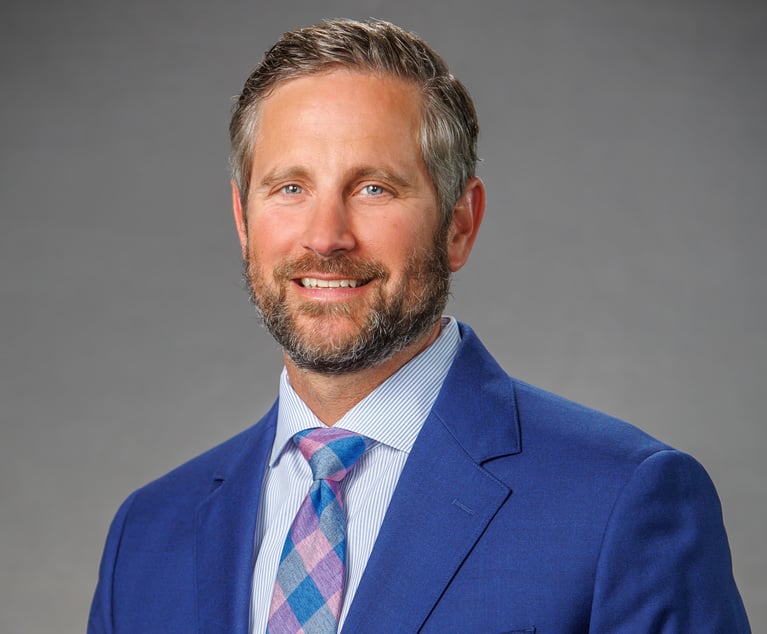Justices Won't Review Ruling That Fraternity Can't Be Barred From Pa. Over Hazing Death
The Pennsylvania Supreme Court has declined to take up an appeal from a Superior Court ruling that said a trial judge lacked authority to bar the Pi Delta Psi fraternity from conducting business in Pennsylvania for a decade over a hazing death that occurred in the Poconos.
December 05, 2019 at 02:52 PM
4 minute read
 Credit: RomanR/Shutterstock.com
Credit: RomanR/Shutterstock.com
The Pennsylvania Supreme Court has declined to take up an appeal from a Superior Court ruling that said a trial judge lacked authority to bar the Pi Delta Psi fraternity from conducting business in Pennsylvania for a decade over a hazing death that occurred in the Poconos.
In a published May 23 opinion, a three-judge panel of the appeals court ruled 2-1 to affirm the trial court's imposition of 10 years' probation and a $112,500 fine for the fraternity, while vacating the portion of the sentence imposing the 10-year ban.
"This court can find nothing in our statutes or at common law that affords a trial court authority to outlaw a corporation from an entire state," Judge Deborah Kunselman wrote for the majority, joined by Judge Anne E. Lazarus.
The Supreme Court denied allocatur in the case Dec. 3.
A Monroe County jury convicted the fraternity of hazing, involuntary manslaughter, aggravated assault, conspiracy to commit aggravated assault, hindering apprehension and conspiracy to hinder apprehension. The case stemmed from a freshman pledge's death during an initiation ritual known as "The Crossing," in which members tackle and body-slam pledges, according to the court's opinion. The death occurred during a trip to the Poconos by the Manhattan-based Baruch College Colony of Pi Delta Psi.
The fraternity challenged the conviction on several grounds, including that it was deprived a fair trial when the trial court barred David L. Westol, an expert on collegiate fraternities, from testifying that the corporation met the national standard of care by promulgating and enforcing an anti-hazing policy.
In refusing to allow the testimony, the trial court reasoned, "Whether [the corporation] acted in conformity with the standards of conduct or care found in other [Greek-lettered organizations] is of no relevance in a criminal case. It will not help jurors understand the evidence or determine a fact in issue."
Kunselman said this rationale "is firmly rooted in the Rules of Evidence, the criminal law, and our appellate precedents."
According to Kunselman, the question of whether the fraternity met a standard of care is irrelevant because the prosecution charged the organization under a theory of vicarious liability.
"Thus, the instant corporation would be vicariously liable for everything that the colony's officers and the national president did in furtherance of the new-member-education program and its initiations rituals, regardless of whether the corporation met the national standard of care by disavowing hazing," Kunselman said. "To the extent that the local and national officers committed any crimes in causing the death of this associate member, so did the corporation, i.e., the principle whose interests all of the agents/officers were pursuing when they physically assaulted the freshman and tried to hide their crimes."
But Senior Judge James Gardner Colins wrote a dissenting opinion arguing that Westol's testimony should have been allowed in precisely because of the prosecution's vicarious liability theory.
"In the instant matter the prosecution's theory as to the guilt of the National Fraternity was basically one of vicarious liability and to exclude the proffered testimony, in my opinion, amounts to a manifest abuse of discretion," Colins said.
Turning to the issue of the probationary condition outlawing Pi Delta Psi from operating in Pennsylvania for 10 years, the Superior Court said there was no legal precedent or legislative authority to support it. Therefore, the court said, the common-law principle dating back to 1612 that a corporation cannot be "'outlawed, nor excommunicated, for [it has] no [soul]'" applies.
"A corporation cannot feel the guilt of the harm it caused, even when that harm resulted in the tragic loss of human life, because it feels nothing at all," Kunselman said. "This corporation, though vicariously liable to make redress for the illegalities of its agent, did not kill anyone. While its negligent management may have fostered a corporate culture that permitted or even encouraged wanton behavior by student members, the corporation did not tackle or physically attack anyone. It has no body with which to do so. And so outlawry of a corporation makes no more sense now than it did in the 17th century, because, like any tool, the corporation is no more morally accountable than a hammer or a sword or a firearm. It is the wielder who sins; not his or her weapon."
Counsel for the fraternity, Wieslaw T. Niemoczynski of Stroudsburg, could not be reached for comment.
Michael Rakaczewski of the Monroe County District Attorney's Office said the case will now go back to the trial court for resentencing.
This content has been archived. It is available through our partners, LexisNexis® and Bloomberg Law.
To view this content, please continue to their sites.
Not a Lexis Subscriber?
Subscribe Now
Not a Bloomberg Law Subscriber?
Subscribe Now
NOT FOR REPRINT
© 2025 ALM Global, LLC, All Rights Reserved. Request academic re-use from www.copyright.com. All other uses, submit a request to [email protected]. For more information visit Asset & Logo Licensing.
You Might Like
View All


JCPenney Customer's Slip-and-Fall From Bodily Substance Suit Best Left for a Jury to Decide, Judge Rules
4 minute read
K&L Gates Sheds Space, but Will Stay in Flagship Pittsburgh Office After Lease Renewal
Trending Stories
- 1'It's Not Going to Be Pretty': PayPal, Capital One Face Novel Class Actions Over 'Poaching' Commissions Owed Influencers
- 211th Circuit Rejects Trump's Emergency Request as DOJ Prepares to Release Special Counsel's Final Report
- 3Supreme Court Takes Up Challenge to ACA Task Force
- 4'Tragedy of Unspeakable Proportions:' Could Edison, DWP, Face Lawsuits Over LA Wildfires?
- 5Meta Pulls Plug on DEI Programs
Who Got The Work
Michael G. Bongiorno, Andrew Scott Dulberg and Elizabeth E. Driscoll from Wilmer Cutler Pickering Hale and Dorr have stepped in to represent Symbotic Inc., an A.I.-enabled technology platform that focuses on increasing supply chain efficiency, and other defendants in a pending shareholder derivative lawsuit. The case, filed Oct. 2 in Massachusetts District Court by the Brown Law Firm on behalf of Stephen Austen, accuses certain officers and directors of misleading investors in regard to Symbotic's potential for margin growth by failing to disclose that the company was not equipped to timely deploy its systems or manage expenses through project delays. The case, assigned to U.S. District Judge Nathaniel M. Gorton, is 1:24-cv-12522, Austen v. Cohen et al.
Who Got The Work
Edmund Polubinski and Marie Killmond of Davis Polk & Wardwell have entered appearances for data platform software development company MongoDB and other defendants in a pending shareholder derivative lawsuit. The action, filed Oct. 7 in New York Southern District Court by the Brown Law Firm, accuses the company's directors and/or officers of falsely expressing confidence in the company’s restructuring of its sales incentive plan and downplaying the severity of decreases in its upfront commitments. The case is 1:24-cv-07594, Roy v. Ittycheria et al.
Who Got The Work
Amy O. Bruchs and Kurt F. Ellison of Michael Best & Friedrich have entered appearances for Epic Systems Corp. in a pending employment discrimination lawsuit. The suit was filed Sept. 7 in Wisconsin Western District Court by Levine Eisberner LLC and Siri & Glimstad on behalf of a project manager who claims that he was wrongfully terminated after applying for a religious exemption to the defendant's COVID-19 vaccine mandate. The case, assigned to U.S. Magistrate Judge Anita Marie Boor, is 3:24-cv-00630, Secker, Nathan v. Epic Systems Corporation.
Who Got The Work
David X. Sullivan, Thomas J. Finn and Gregory A. Hall from McCarter & English have entered appearances for Sunrun Installation Services in a pending civil rights lawsuit. The complaint was filed Sept. 4 in Connecticut District Court by attorney Robert M. Berke on behalf of former employee George Edward Steins, who was arrested and charged with employing an unregistered home improvement salesperson. The complaint alleges that had Sunrun informed the Connecticut Department of Consumer Protection that the plaintiff's employment had ended in 2017 and that he no longer held Sunrun's home improvement contractor license, he would not have been hit with charges, which were dismissed in May 2024. The case, assigned to U.S. District Judge Jeffrey A. Meyer, is 3:24-cv-01423, Steins v. Sunrun, Inc. et al.
Who Got The Work
Greenberg Traurig shareholder Joshua L. Raskin has entered an appearance for boohoo.com UK Ltd. in a pending patent infringement lawsuit. The suit, filed Sept. 3 in Texas Eastern District Court by Rozier Hardt McDonough on behalf of Alto Dynamics, asserts five patents related to an online shopping platform. The case, assigned to U.S. District Judge Rodney Gilstrap, is 2:24-cv-00719, Alto Dynamics, LLC v. boohoo.com UK Limited.
Featured Firms
Law Offices of Gary Martin Hays & Associates, P.C.
(470) 294-1674
Law Offices of Mark E. Salomone
(857) 444-6468
Smith & Hassler
(713) 739-1250





